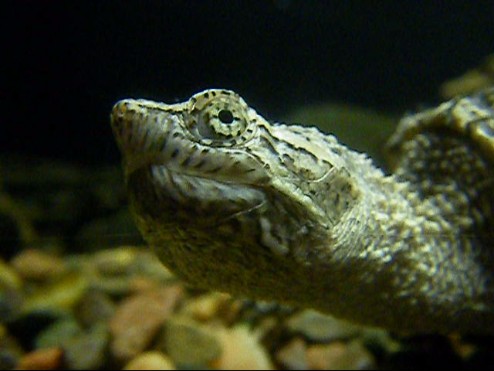
Terrapin Poses Traditional February 14th Question
“Never in my wildest dreams did I think that so many people would turn out on Valentine’s Day to hear about turtles,” exclaimed one board member of the Wareham Land Trust that co-sponsored our Turtles Gone Wild presentation at the Wareham Free Library on Saturday.  We were not surprised in the slightest. When we arrived 90 minutes before the presentation to begin our set-up ritual, librarians and board members tried to lower expectations. “It’s school vacation week and many families have gone south.” “Attendance has been so slow for our library programs lately.” “No one’s coming out on these cold winter days.” “It’s a holiday weekend and Valentine’s Day. Who wants to come to the library to hear about turtles?” And so on. To each we responded, “You just don’t understand the magic of turtles. Everyone has a turtle story tucked deep down inside their memories and adults, consciously or subconsciously, want their children and grand children to share these transformational moments. We will have standing room only.” And so we did.
 Â
Â
Wareham Free Library Ready to Receive Turtle Guests
Â
We joined librarians and board members of the Wareham Land Trust in setting up chairs for the maximum seating capacity of 105 in the church-like auditorium. Sue Wieber Nourse and Don Lewis assembled electronics, strung wires, arranged photo displays and books and shells, and prepared live specimens to meet the crowds.
Â
Â
Design on Wareham Land Trust Tee Shirts and Bumper Stickers
Â
Others hung banners, spread out refreshments (including an assortment of delicious cookies made to resemble turtles!), and set up a membership table for the land trust with freshly minted tee shirts and bumper stickers that read (see above), “I love turtles.” Quite appropriate for Valentine’s Day. With in all readiness, we waited for our guests.
Â
Â
Standing Room Only (S.R.O.) at the Wareham Free Library
Â
People began arriving long before showtime and kept arriving and arriving well into the presentation.  One hundred five chairs filled faster than a snapper’s snap, so children were invited to come up front and sit on the floor by the screen. People perched on counters and tables lining the sides to get a good view of the stage, while more guests continued to stream into the auditorium.
Â
While waiting for the show to start, “kids” from four to one hundred four flooded to the front of the room where Sue Wieber Nourse introduced them to two diamondback terrapin hatchlings that had been born on Halloween and have been hiding out in our lab for the winter before returning to the wild (see New Bedford Standard Times photo below).
Â
Â
Â
“Turtles Gone” Wild Introduction
 Â
A little after 10:30 am the presentation kicked off with high energy introductions and with appropriate homage paid to Valentine’s Day. We will defer to Jennifer Lade of the New Bedford Standard Times for a more dispassionate analysis of the actualÂ
Turtles Gone Wild performance (see immediately below). Click on the title,
Turtle Guys Draws Crowd at Wareham Free Library, to read the original story published February 15th in the Standard Times, along with additional photographs by David W. Oliveira. Suffice to say that even after more than an hour of virtual turtle adventures the pitch of childlike excitement remained so high that few left the auditorium without waiting in long lines to tell their personal stories of encounters with our hard shelled friends and without a long, last close-up look at the terrapin hatchlings.
====================
(Click on title above for original story published February 15th in the New Bedford Standard Times)
Â
Sue Wieber Nourse Shows Terrapin Hatchlings
(Photo by David W. Oliveira, Standard Times special)
Â
By Jennifer Lade
February 15, 2009 6:00 AM
Â
It was appropriate that “Turtle Guy” Don Lewis picked Valentine’s Day to visit the Wareham Free Library to talk about the shelled creatures — he really loves turtles.
“They are just so gorgeous,” he said, only half-joking, as somewhat hideous close-up photos of snapping turtles flashed across the screen.
In the library’s packed meeting room, Lewis, with the help of his partner, Sue Wieber Nourse, inspired adults and children to share his affection for the reptiles with a high-energy, entertaining look at the different types of turtles that inhabit the land and water of SouthCoast and Cape Cod, many of which are threatened or endangered.
The Turtles Gone Wild presentation, attended by at least 130 people, was sponsored by the Wareham Land Trust and the Wareham Free Library.
Children sat on the floor at the front of the room as Lewis told them how to identify different kinds of turtles, and taught them the importance of “temperature, temperature, temperature,” which is the answer to everything from what turtles regulate by basking in the sun to what determines the gender of a turtle.
Lewis never stopped smiling during the presentation, whether he was acting out — very slowly — a box turtle chasing its prey, a snail, or showing video of a diamondback terrapin digging her nest while “The Hokey Pokey” played on speakers.
Many of the photos and videos were of turtles that he found in Wareham.
He even gave helpful tips to people who want to help snapping turtles get out of the road: stay away from their heads, wear heavy gloves or “send the kids out to do it.”
Lewis has rescued and studied hundreds of turtles during his career, and he coupled his enthusiasm for them with advice to people on how to protect them.
He urged people to use caution when mowing their lawns, because box turtles can hide in the grass.
He displayed photos of the rescue of a 950-pound sea turtle that got caught in the lines attached to lobster traps, and described how the turtle glided through the water after it was freed.
“It’s a sight that is absolutely magnificent to see,” he said.
The Wareham Land Trust identifies properties where turtles are found and works to protect them.
For more information, go to http://www.warehamland.org/.
Contact Jennifer Lade at jlade@s-t.com
====================










